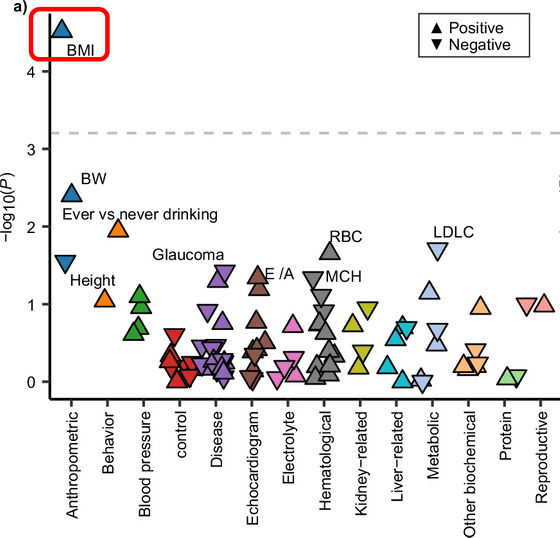Research shows that Japanese people who inherited Jomon DNA have a high BMI, suggesting that hunter-gatherer DNA may be a health risk in modern times

By
A study has reported that the genetic characteristics of the Jomon people, a hunter-gatherer population living in ancient Japan, are associated with a high body mass index (BMI). The study also provides support for the 'triple structure model,' which posits that modern Japanese people inherit DNA from three lineages, including the Jomon people.
Genetic legacy of ancient hunter-gatherer Jomon in Japanese populations | Nature Communications
https://www.nature.com/articles/s41467-024-54052-0
Genetic legacy of Jomon hunter-gatherers linked to increased BMI in modern Japanese - News & Events | Trinity College Dublin
https://www.tcd.ie/news_events/top-stories/featured/genetic-legacy-of-jomon-hunter-gatherers-linked-to-increased-bmi-in-modern-japanese/
Ancient hunter-gatherer DNA linked to higher BMI in modern Japanese people | Live Science
https://www.livescience.com/health/genetics/ancient-hunter-gatherer-dna-linked-to-higher-bmi-in-modern-japanese-people
A research team led by Associate Professor Shigeki Nakagome of the School of Medicine at Trinity College Dublin conducted an analysis using genetic data from 171,287 people living across Japan collected by Biobank Japan , as well as genomes from ancient Japanese and Eurasians, and East Asian genomes collected in the UK Biobank, totaling approximately 250,000 genomes.
This allowed researchers to examine how the DNA inherited from the Jomon people is related to 80 different characteristics of modern Japanese people.
As a result, it was found that Japanese people inherited 12.5% of their DNA from the Jomon people on average. Furthermore, it was found that the only trait out of 80 traits that was associated with Jomon DNA was BMI, so the researchers wrote in their paper that 'people with this DNA may be at higher risk of obesity.'

Commenting on the results, Nakagome said: 'Overall, these results suggest that the genetic heritage of the ancient hunter-gatherers of the Jomon may have a significant impact on BMI across the population today, regardless of geographic differences, and therefore contribute to an increased risk of obesity. This is a really important finding that our ancient hunter-gatherer ancestry likely plays an important role in the health of modern people. The association with elevated BMI may also help explain some of the disparities in obesity rates among Asians living in Western countries.'
The researchers say the Jomon genes were highly active in skeletal muscle cells involved in voluntary movement, suggesting a possible adaptation related to the high levels of physical activity required for a hunter-gatherer lifestyle. Previous research has also shown that some of the Jomon genes may increase bone density.
'Rapid changes in diet and lifestyle may mean that traits that were beneficial in hunter-gatherer societies today have a negative effect on disease risk,' the team concluded in their paper.

The study also offers insight into the origins of the Japanese people themselves. For many years, the mainstream theory in this field was a two-tiered model, consisting of the Jomon people, a hunter-gatherer people dating back 16,500 years ago, and farmers who migrated from Northeast Asia. In recent years, however, a three-tiered model has been proposed, which also includes East Asian ancestors dating back to the Kofun period, a period of state formation about 1,700 years ago.
This study, which analyzed the genomes of more than 250,000 people across regions and time periods, provided data that strongly supported this three-fold model.
Regarding the origins of Japanese DNA, Nakagome said, 'Our analysis, which for the first time shows detailed characteristics of a tripartite structure across the Japanese archipelago, fits more broadly and consistently than the two-part structure hypothesis. We also found considerable variation in the proportion of Jomon ancestry, which reflects the continuity of genetic ancestry seen in modern Japanese people.'
Regarding the research as a whole, Nakagome said, 'The field of ancient genomics is developing rapidly, and as research progresses on a variety of ancient human species across different eras and regions, we will be able to gain a more comprehensive understanding of the extent to which humanity's past has shaped the genomes and phenotypic variations of modern humans. I am convinced that there is still much to be discovered, both in Japan and around the world.'
Related Posts:
in Science, Posted by log1l_ks







